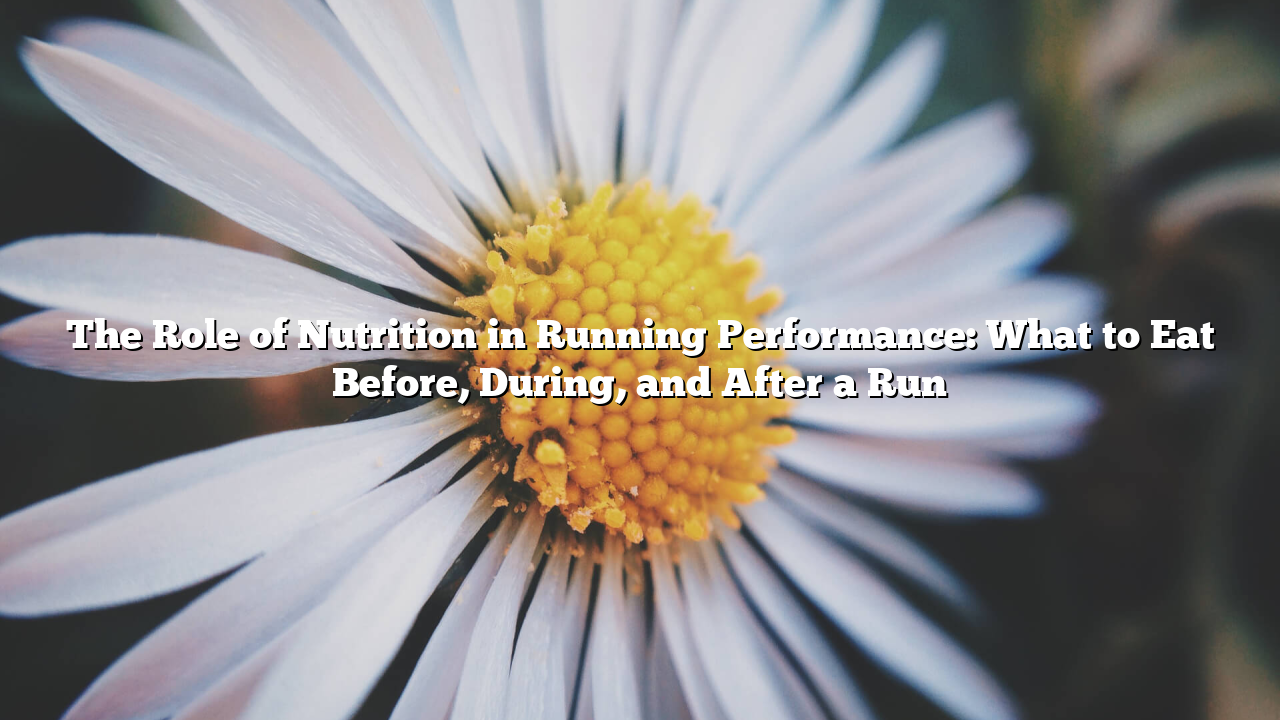Proper nutrition is essential for optimal running performance, recovery, and endurance. Whether you’re training for a race or simply running for fitness, knowing what to eat before, during, and after a run can boost energy levels, enhance performance, and reduce muscle fatigue.
In this article, we’ll explore the best foods and hydration strategies to fuel your body for running.
1. The Importance of Nutrition for Runners
✔ Running depletes energy stores (glycogen), fluids, and electrolytes.
✔ A well-balanced diet provides the right mix of carbohydrates, proteins, and fats.
✔ Proper hydration prevents cramps, fatigue, and dehydration.
Why It Matters:
✔ Good nutrition helps maintain consistent energy levels.
✔ It reduces the risk of muscle breakdown and injuries.
—
2. What to Eat Before a Run
✔ Eating the right foods before a run ensures you have enough energy.
✔ The best pre-run meals are high in carbohydrates, moderate in protein, and low in fat and fiber to prevent stomach discomfort.
Best Pre-Run Foods (30-90 Minutes Before a Run):
✔ Oatmeal with bananas and honey.
✔ Whole wheat toast with peanut butter.
✔ Greek yogurt with granola and berries.
✔ A smoothie with fruit, almond milk, and protein powder.
✔ A small serving of brown rice with grilled chicken.
Avoid:
❌ High-fat, fried foods (they slow digestion).
❌ Too much fiber (can cause stomach discomfort).
❌ Spicy or acidic foods (may lead to heartburn).
—
3. What to Eat During a Run
✔ For runs under 60 minutes, water is usually enough.
✔ For long-distance runs (60+ minutes), your body needs quick-digesting carbohydrates to maintain energy.
Best Mid-Run Fuel Options:
✔ Energy gels or chews (consume every 30-45 minutes).
✔ A small banana or dried fruit.
✔ Electrolyte drinks or coconut water.
✔ Sports bars with fast-absorbing carbs.
Hydration Tips:
✔ Drink water every 15-20 minutes during long runs.
✔ If running for 90+ minutes, alternate between water and electrolyte drinks to replace lost minerals.
—
4. What to Eat After a Run
✔ The post-run meal is crucial for muscle recovery and glycogen replenishment.
✔ Aim for a carb-to-protein ratio of 3:1 or 4:1 within 30-60 minutes after running.
Best Post-Run Meals & Snacks:
✔ A protein smoothie with banana, milk, and whey protein.
✔ Grilled chicken with quinoa and steamed vegetables.
✔ Whole wheat toast with avocado and scrambled eggs.
✔ Cottage cheese with fruit and honey.
✔ A bowl of brown rice with salmon and leafy greens.
Hydration Tips:
✔ Replenish fluids by drinking 16-24 oz of water post-run.
✔ For long or intense runs, drink electrolyte-rich fluids to restore sodium and potassium levels.
—
5. The Best Diet for Runners: Daily Nutrition Guide
✔ A balanced diet ensures consistent energy levels and overall health.
✔ Focus on carbohydrates, lean proteins, healthy fats, and vitamins.
Key Nutrients for Runners:
1. Carbohydrates (50-60% of diet) → Primary fuel source.
✔ Whole grains, fruits, sweet potatoes, quinoa.
2. Proteins (15-20% of diet) → Muscle repair and recovery.
✔ Chicken, fish, eggs, lentils, nuts, tofu.
3. Healthy Fats (20-30% of diet) → Supports energy storage and joint health.
✔ Avocados, nuts, olive oil, fatty fish.
4. Vitamins & Minerals → Boosts performance and immunity.
✔ Iron (spinach, red meat) → Prevents fatigue.
slot idn (milk, almonds) → Strengthens bones.
✔ Magnesium (bananas, nuts) → Reduces cramps.
—
6. Hydration for Runners
✔ Dehydration can cause fatigue, dizziness, and cramps.
✔ Proper hydration prevents overheating and helps muscle function.
How Much Water Should You Drink?
✔ Before a run: 16-20 oz of water 2-3 hours before.
✔ During a run: 4-8 oz every 15-20 minutes.
✔ After a run: 16-24 oz within an hour.
Signs of Dehydration:
✔ Dry mouth, dark urine, dizziness, and fatigue.
Electrolyte Replenishment:
✔ For runs longer than an hour, drink sports drinks, coconut water, or electrolyte tablets.
—
7. Supplements for Runners: Are They Necessary?
✔ A well-balanced diet provides most nutrients, but some runners may benefit from supplements.
Best Supplements for Runners:
✔ Electrolytes – Prevents dehydration.
✔ BCAAs (Branched-Chain Amino Acids) – Aids muscle recovery.
✔ Iron – Prevents fatigue (especially for female runners).
✔ Omega-3s – Reduces inflammation and supports heart health.
Do You Need Supplements?
✔ If your diet lacks variety, supplements can help fill gaps.
✔ Always consult a nutritionist or doctor before taking supplements.
—
8. Race Day Nutrition Strategy
✔ The day before: Eat a carb-rich meal (pasta, rice, bread).
✔ Race morning: Eat a light, high-carb meal (banana with toast).
✔ During the race: Consume gels or sports drinks for energy.
✔ After the race: Rehydrate and eat a balanced meal with carbs and protein.
—
9. Common Nutrition Mistakes Runners Make
❌ Skipping pre-run meals → Leads to low energy.
❌ Not drinking enough water → Causes dehydration and fatigue.
❌ Too much fiber before a run → Can cause stomach discomfort.
❌ Ignoring post-run recovery meals → Slows muscle repair.
—
10. Conclusion
Nutrition plays a key role in running performance, endurance, and recovery. Eating the right foods before, during, and after your runs ensures you stay energized, hydrated, and injury-free.
By following a well-balanced diet, drinking enough fluids, and timing your meals correctly, you can maximize your running potential and feel stronger on every run.
The Role of Nutrition in Running Performance: What to Eat Before, During, and After a Run











Leave a Reply